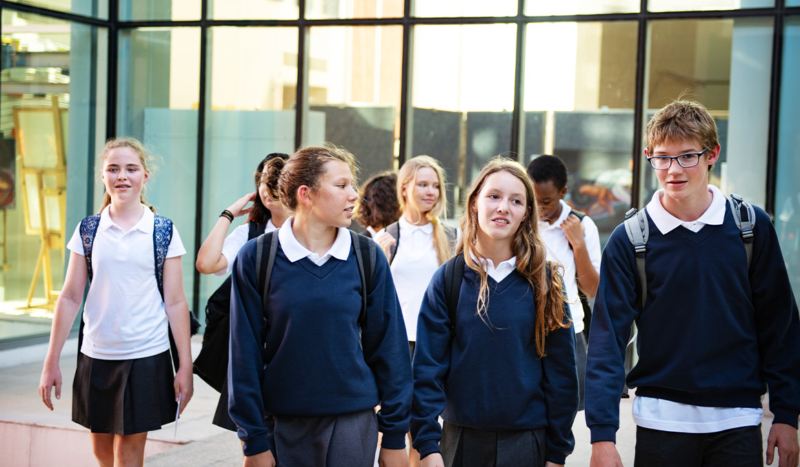
Adobe Stock
The Diocese of Charlotte is backing a private school at the center of a high-profile legal battle with parents who say their children were expelled for challenging the school’s ideological shift, The Carolina Journal reported Aug. 5.
The case, Turpin v. Charlotte Latin School, stems from the 2021 expulsion of two students whose parents, Doug and Nicole Turpin, had objected to what they described as a concerning ideological shift at the school.
The Turpins said they were penalized after Doug Turpin voiced objections to what they saw as harmful ideological agenda. Charlotte Latin — an independent, non-sectarian school — counters that the decision was consistent with enrollment contracts that allow for termination if the parent-school relationship becomes unworkable.
That argument has so far prevailed in court. In April, the North Carolina Court of Appeals ruled against the Turpins for a second time, in a 2–1 split decision. The state Supreme Court is set to review the case in October.
In 2023, Doug Turpin publicly detailed in an editorial published by the North State Journal what he described as a pattern of ideological overreach and retaliation by the school’s leadership. He and his wife, Nicole, had helped form Refocus Latin, a group of concerned parents who raised objections to what they called “alarming virtue-signaling” and “woke class assignments,” along with politically charged content and sexually explicit material in the school library.
The group was invited to present its concerns to the board, with the explicit assurance that there would be no retaliation, Turpin wrote in the article.
Turpin said that shortly after that presentation, his children were expelled without warning. He said he reached out to the entire board following the expulsions, but only received a response from the board chair — a longtime associate of the headmaster — who stated that the school had the authority to expel “any child at any time if he deemed that the school did not have a ‘positive and collaborative working relationship’ with their parents.”
In remarks to faculty, Headmaster Charles Baldecchi had described the Refocus Latin group’s presentation as “just awful,” claiming it was produced in “bad faith” and accusing the parents involved of seeking to “rip [the school’s] fabric apart.”
He further labeled the group’s concerns a “lost cause” and discouraged staff from engaging with them.
The Turpins maintain that all their interactions with school leadership, including Refocus Latin’s presentation, were respectful and measured.
“We can easily demonstrate that our communication to the school was civil, respectful, and not inappropriate,” Turpin said in a public statement. “We followed the instructions in the school policies for how to provide concerns.”
Charlotte Latin argued that its actions were consistent with its policies.
“In its contract, Latin expressly reserved the right to terminate its agreement with parents if Latin determined that a positive, collaborative working relationship was impossible,” the school’s legal team reiterated in its July brief. “That is all that happened here.”
Ahead of the October hearing, the diocese is urging justices to consider what it describes as a broader constitutional issue, outlined in a friend-of-the-court brief filed Aug. 4.
“These contractual provisions are essential tools that allow religious schools to carry out their faith-based educational missions,” wrote diocesan attorney Joshua Davey, the Carolina Journal reported.
He added that such agreements are “not only about discipline, but about providing clarity and transparency to families who voluntarily choose to enroll.”
For the diocese, however, the implications run deeper. It warned that allowing courts to overrule these agreements could open the door to judicial entanglement in religious decisions.
“[E]nforcing such provisions as written not only accords with longstanding principles of North Carolina contract law but also avoids entangling courts in religious questions and protects the constitutional autonomy of private religious schools under the Free Exercise and Establishment Clauses of the First Amendment to the U.S. Constitution,” the court filing continued.
The diocese also noted that its intervention brings a new perspective not yet raised by any party in the case.
“[T]he Diocese also presents this Court with an alternative argument, made by no existing party, that underscores the broader significance of this case for private religious schools across North Carolina and highlights First Amendment concerns that no party has addressed in depth,” Davey wrote.
In May, U.S. Representatives Richard Hudson and Pat Harrigan joined 11 North Carolina state lawmakers and several advocacy groups in filing a separate amicus brief in support of the Turpins, the Carolina Journal reported.
The filing criticized Charlotte Latin’s handling of the situation and warned that the case could set a dangerous precedent for parental rights.
“When private schools unfairly retaliate against students and their parents, can the schools be held accountable?” wrote attorney Troy Shelton on behalf of the group. “That’s where Charlotte Latin broke its promises, smeared the Turpins in public, and expelled the children.”
The brief argued that granting schools authority to sever enrollment over parental disagreement “undermines the foundational trust between families and schools in North Carolina.”
In their brief, the school asserted that its authority stems from a contractual relationship — one that differs sharply from the obligations of public institutions.
“Unlike public schools, the relationship between students, parents, and Latin are governed by contract,” the school’s lawyers wrote. “Like other businesses, consumers have the right to decide if they want to do business with Latin. Similarly, Latin has the right to decide if it wants to do business with consumers.”

